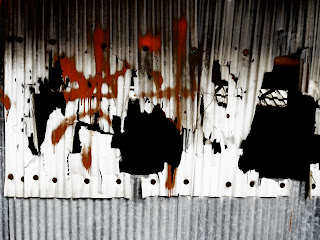
Remains of the Kinkaseki Mining Complex
Several UK news outlets are reporting on Chris Hoy, the cycling star from Scotland, who nominated his 94 year-old great-uncle for the honor of carrying the Olympic torch during the opening of the Olympic Games, which are to be held in London during the summer of 2012.
Hoy's great-uncle, Andy Coogan, was regarded as a major Olympic contender during the 1930's, until his training was sidelined by war and he was subsequently captured during the fall of Singapore and shipped out to toil under brutal conditions in the Kinkaseki copper mines as a POW.
Andy Coogan was a top Scottish runner until he was captured by the Japanese and almost died as a prisoner of war.
Now 94, he endured terrible beatings as a slave in a copper mine in Taiwan and survived appalling journeys on Japanese hellships that took him to a prisoner of war camp near Nagasaki, where the Atom bomb was dropped.
After nearly four years of starvation, torture and disease he returned to Scotland after the war weighing just 6st.
He never regained his pre-war form as one of Scotland's most promising athletes and missed out on his dream of selection for the 1948 Great Britain Olympic team.
The mines in the hills above present-day Jinguashi on Taiwan's northern coast were part of one of the largest pre-war industrial complexes in East Asia. Miners dug for copper, iron and even gold inside the bright green hillsides. For allied POWs the conditions were harsh with frequent beatings, backbreaking labor, and, as the war for Japan soured, even less food.
The treatment of the POWs in Taiwan does not just highlight the savage brutality of the Japanese imperial machine, it also brings into focus the role and responsibility Taiwanese played in the complex negotiations between the colonized and the colonizer; a relationship many Taiwanese have been unable to reconcile as the Taiwanese identity and experience was subsumed by the political needs of the allies and the ROC during the Cold War.
Taiwan historian, Patrick Cowsill shows the role Taiwanese guards played at POW camps around Taiwan, much like the one Mr. Coogan was assigned to.
"We christened [the Taiwanese guards] the 'Runabouts' or 'Goons.' They seemed to be the lowest type in the army. Very young, they jumped at the commands of the lowliest [of] Japanese privates, who did not hesitate to slap them in the face. Face slapping seemed to be allowed from officer down through NCOs to privates in the Japanese Army. The Formosans were below privates and as we soon learnt, we were at the end of the line . . . These young 'Runabouts' reveled in their power, and they loved to rush into the hut, trying to catch prisoners too slow in bowing and coming to attention." - Jack Edwards, British POW at the Kinkaseki (金瓜石) and Hsintien (新店) camps
Mr. Cowsill shows how many Taiwanese were complicit in human rights abuses during WWII as colonial subjects of Japan. The actions taken by the Taiwanese guards demonstrate the ambivalence between the colonizer and colonized and a Taiwanese ambivalence in remembering its colonial past. It also demonstrates how the political ideology and coloniality of the ROC on Taiwan has prevented Taiwanese from fully coming to terms with the experience as a Japanese colony.
Following Japan's defeat, Taiwanese were suddenly regarded by their new rulers as victims, slaves, fallen or "backward" Chinese and ethnic traitors. At the same time they were reassigned an ROC identity, complete with a new history and ideological lineage to Dr. Sun Yat-sen--a virtual alien in Taiwan.
Overnight "we" had become "they". The Japanese colonials who had just lost a war with the Americans had suddenly become the victors while bearing the weight of another colonial project. The deeds, moods and feelings of the ROC were to anachronously represent the deeds, moods and feelings of the Taiwanese. The Japanese past was to be forgotten and replaced.
It is through this deliberate and forced act of forgetting that the Taiwanese experience as Japanese colonials became reified and reconstructed by locals in a deliberate contrast to the ROC. This problematic post-coloniality has created a selective memory of victimhood that interferes in allowing all Taiwanese to more objectively come to terms with Taiwan's culture, history and experience.
Many of those guards may have turned right around and worked at American bases after the war without inquiry into their wartime activities.
Only through realigning Taiwan's history and experience with the island of Taiwan as the central feature, and moving away from the ROC's China centered model, can Taiwanese begin to look at their image in the mirror to accept and understand their role as regional actors with rights and responsibilities that need to be upheld. The actions of the prison guards have been largely swept away and forgotten-- except by the survivors in men like Mr. Coogan.













































































































